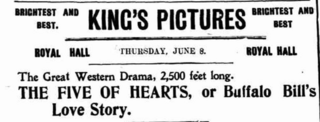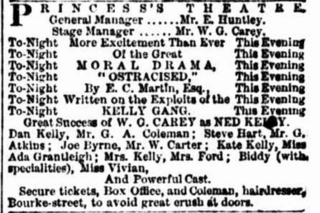Related Research Articles

Thunderbolt is a 1910 Australian feature film based on the life of the bushranger Captain Thunderbolt. It was the directorial debut of John Gavin who later claimed it was the first "four-reel movie" made in Australia. It has also been called the first film made in New South Wales.
"The Maid Freed from the Gallows" is one of many titles of a centuries-old folk song about a condemned maiden pleading for someone to buy her freedom from the executioner. Other variants and/or titles include "The Gallows Pole", "The Gallis Pole", "Hangman", "The Prickle-Holly Bush", "The Golden Ball", and "Hold Up Your Hand, Old Joshua She Cried." In the collection of ballads compiled by Francis James Child in the late 19th century, it is indexed as Child Ballad number 95; 11 variants, some fragmentary, are indexed as 95A to 95K. The Roud Folk Song Index identifies it as number 144.

Frank Gardiner, the King of the Road is a 1911 Australian film about the bushranger Frank Gardiner, played by John Gavin, who also directed. It was the fourth consecutive bushranger biopic Gavin made, following movies about Captain Thunderbolt, Captain Moonlite and Ben Hall.

The Assigned Servant, or the Life Story of a Deported Convict is a 1911 Australian silent film about a convict who is transported to Van Diemen's Land. It was made by the husband-and-wife team of John and Agnes Gavin and is considered a lost film.

Assigned to his Wife is a 1911 Australian silent film from director John Gavin. It is a convict-era "military romantic melodrama".
The Man They Could Not Hang is a 1934 Australian film directed by Raymond Longford about the life of John Babbacombe Lee, whose story had been filmed previously in 1912 and 1921. These silent films were called "one of the greatest box-office features that ever came out of this country." The sound film was not as successful.
Robbery Under Arms is a 1907 Australian silent western/drama film based on the 1888 novel by Rolf Boldrewood about two brothers and their relationship with the bushranger Captain Starlight. It was the first film version of the novel and the third Australian feature ever made.

The Lady Outlaw is a 1911 Australian silent film set in Van Diemen's Land during convict days.
The Love Tyrant is a 1912 Australian silent film directed by Alfred Rolfe. It was described as an "Australian drama about the back blocks" and a "stirring drama full of thrilling incidents". It was set during the early bushranging days.

The Wreck of the Dunbar or The Yeoman's Wedding is a 1912 Australian silent film directed by Gaston Mervale starring Louise Lovely. The plot concerns the shipwreck of the Dunbar, one of Australia's worst maritime disasters. It is considered a lost film.
The Ticket of Leave Man is a 1912 Australian silent film directed by Gaston Mervale starring Louise Lovely.

The Five of Hearts, or Buffalo Bill's Love Story is a 1911 Australian film from Edward Irham Cole based on a stage play about Buffalo Bill which Cole had performed extensively. It is also known as A Maiden's Distress or Buffalo Bill. It was reportedly the longest of Cole's films.

Sentenced for Life is an Australian film directed by E. I. Cole. It was an adaptation of a play performed by Cole and his Bohemian Dramatic Company as early as 1904.

The Life Story of John Lee, or the Man They Could Not Hang is a 1912 Australian silent film based on a stage play about the true life story of John Babbacombe Lee.

The Life Story of John Lee, or the Man They Could Not Hang is a 1921 Australian silent film based on the true life story of John "Babbacombe Lee. It is a remake of a 1912 film with some extra scenes of Lee's childhood.
Arthur William Sterry (1883–1944) was an Australian filmmaker, actor and theatrical entrepreneur. He was born in Collingwood, Victoria and his family moved to Wagga Wagga when he was young. At the age of 18 Sterry moved to Melbourne. He went to work for J. C. Williamson Ltd for a time and ended up establishing his own drama company, Arthur W Sterry's Dramatic Company. He later went to work for the theatrical entrepreneur Philip Lytton, performing in a number of shows including The Waybacks.
The Kelly Gang; or the Career of the Outlaw, Ned Kelly, the Iron-clad Bushranger of Australia is an 1899 Australian play about bushranger Ned Kelly. It is attributed to Arnold Denham but it is likely a number of other writers worked on it.

Edward Irham Cole was an Australian theatrical entrepreneur and film director whose productions represented a synthesis of Wild West show and stage melodrama. He managed a theatre company, called the Bohemian Dramatic Company, that performed in semi-permanent and temporary tent theatres. During 1910 and 1911 Cole directed a number of silent films, adapted from his stage plays and using actors from his theatre company.

Ostracised, or Every Man's Hand Against Them is a 1881 Australian play about Ned Kelly by E.C. Martin. It was the first straight dramatisation of the Kelly story from an Australian writer although there had been one in London. The play was banned in Sydney.
References
- ↑ "Advertising". The Horsham Times . No. 5415. Victoria, Australia. 31 December 1912. p. 5. Retrieved 10 July 2024– via National Library of Australia.
- ↑ "AMUSEMENTS". Kalgoorlie Miner (WA : 1895 - 1950) . WA: National Library of Australia. 20 April 1913. p. 6. Retrieved 7 December 2012.
- ↑
- Autobiography published 1910 - April 23, April 30 Pt 1, April 30 Pt 2, 7 May Pt 1, 7 May Pt 2, 14 May, 21 May, 28 May, 4 June, 11 June, 18 June
- 1 2 Vagg, Stephen (3 September 2024). "The most profitable Australian film of all time – The Man They Could Not Hang". Filmink. Retrieved 3 September 2024.
- ↑ "DRAMATIC TOUCHES". Auckland Star. 1 September 1928. p. 5 (Supplement).
- ↑ "AMUSEMENTS". The Daily News. Vol. XXXII, no. 11, 819. Western Australia. 12 May 1913. p. 2 (THIRD EDITION). Retrieved 10 July 2024– via National Library of Australia.
- ↑ "At Poverty Point", The Bulletin, Sydney, N.S.W: John Haynes and J.F. Archibald, 25 April 1912, nla.obj-644420288, retrieved 11 July 2024– via Trove
- ↑ "Advertising". Ovens and Murray Advertiser . No. 9489. Victoria, Australia. 27 January 1912. p. 2. Retrieved 11 July 2024– via National Library of Australia.